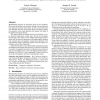Free Online Productivity Tools
i2Speak
i2Symbol
i2OCR
iTex2Img
iWeb2Print
iWeb2Shot
i2Type
iPdf2Split
iPdf2Merge
i2Bopomofo
i2Arabic
i2Style
i2Image
i2PDF
iLatex2Rtf
Sci2ools
117
Voted
CACM
2010
2010
FastTrack: efficient and precise dynamic race detection
Multithreaded programs are notoriously prone to race conditions. Prior work on dynamic race detectors includes fast but imprecise race detectors that report false alarms, as well as slow but precise race detectors that never report false alarms. The latter typically use expensive vector clock operations that require time linear in the number of program threads. This paper exploits the insight that the full generality of vector clocks is unnecessary in most cases. That is, we can replace heavyweight vector clocks with an adaptive lightweight representation that, for almost all operations of the target program, requires only constant space and supports constant-time operations. This representation change significantly improves time and space performance, with no loss in precision. Experimental results on Java benchmarks including the Eclipse development environment show that our FASTTRACK race detector is an order of magnitude faster than a traditional vector-clock race detector, and ro...
Related Content
| Added | 28 Feb 2011 |
| Updated | 28 Feb 2011 |
| Type | Journal |
| Year | 2010 |
| Where | CACM |
| Authors | Cormac Flanagan, Stephen N. Freund |
Comments (0)

